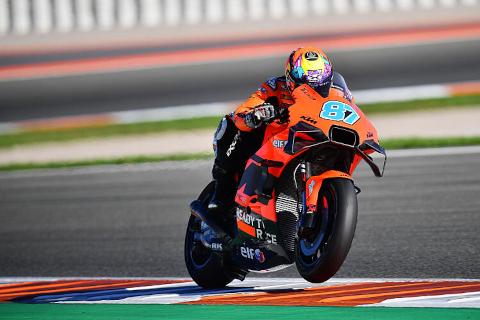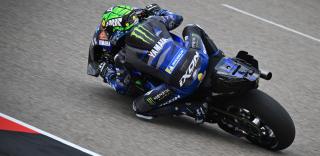MotoGP is the pinnacle of motorcycle racing, bringing together the best riders in the world and cutting-edge prototypes. The technological challenge is crucial and requires teams to remain at the forefront of research and development.
Since 2024, the technical regulations have required participants to use 40% non-fossil fuel. TotalEnergies has signed a multi-year technical partnership contract with Yamaha to become the official fuel supplier to the Yamaha Monster Energy MotoGP team. The product supplied has been tailor-made for the YZR-M1 engine, thanks to close collaboration between TotalEnergies and Yamaha Motor Co. engineering teams. It has been developed to maximise engine power and minimise fuel consumption. This solution is based on TotalEnergies' most advanced technology, in particular its 'Excellium' additive technology.
ELF and MotoGP

TotalEnergies has been involved in Grand Prix motorcycle racing since 1973, first with the ELF brand. Over the years, the expertise of the TotalEnergies Group's laboratories has grown to develop fuels and lubricants adapted to the specific needs of its various partners.
There has also been no shortage of sporting success. In 1974, Phil Read won the 500 Grand Prix, giving the French oil company its first title in the premier class. Between 1978 and 1986, ELF contributed to the development of new technologies by funding the projects of brilliant engineers such as André De Cortanze. During this period, a number of riders made their mark with the support of the French oil company. This was the case with Raymond Roche, who finished fourth in the 1984 World Championship under the Total banner. In addition to its numerous victories, the Group also played a major role in the development of racing motorcycles, as evidenced by the innovative technical solutions developed for its ELF X and ELF E motorcycles, protected by no less than 18 technological patents. In 1991, ELF joined forces with HRC to support the official Honda team. With the ELF logo, Loris Capirossi won his second 125cc World Championship title. Three years later the French brand supported Mick Doohan as he won the first of his five 500cc titles. In 1996 Olivier Jacque took his first World Championship win in ELF colours. The following season, a new 500cc Grand Prix machine was created on the initiative of Michel Métraux, the distributor of ELF products in Switzerland. In 2001, ELF accompanied the Tech 3 team as it moved up to the premier class. Five years later, the brand was at the side of Kawasaki when it returned to Grand Prix racing in the MotoGP class. The Japanese manufacturer used the experience of the ELF engineers to intensify the development of the ZX-RR. It was then Lucio Cecchinello's Honda LCR team, followed by the Marc VDS team, that benefited from ELF's support to shine in MotoGP. The first with Randy de Puniet, Toni Elias and Stefan Bradl, the second with Scott Redding and Jack Miller, the latter even taking his first premier class win with the Belgian team. More recently, the Tech 3 riders of the Pierer Mobility group have also been sporting the ELFs colours.
For the chemists and engineers of the TotalEnergies Group, the competition is so interesting because it is an excellent test bed for fuels and lubricants. MotoGP is a fascinating field of experimention, especially since not all manufacturers use the same fuel. Products have to be developed that are specifically adapted to the characteristics and requirements of the different engines. The engineers' job is to understand the manufacturers' mechanical problems, interpret them and translate them into chemical formulas.
-
400million TV viewers
-
7world champion titles for the ELF brand
-
26different nationalities across all the categories
The challenges for 2024
Despite all the victories and titles, Ducati just can't seem to get enough. The Italian engineers may have won it all, but they are not letting up. The new Desmosedici has been dominating off-season testing and Francesco Bagnaia looks to be the favourite to succeed him again this year, although Jorge Martin and Enea Bastianini are said to be capable of giving him a run for his money. The Ducati armada has also been strengthened this year by the arrival of Marc Marquez at Gresini. The six-time MotoGP World Champion, now teamed with his brother Alex, left Honda to get back on track after four seasons of doubt and injury. Aprilia could be the other Italian manufacturer to watch this season. Aleix Espargaro had some promising tests in February, and the Noale-based manufacturer should also be able to rely on the new American Trackhouse structure headed by Davide Brivio to help Miguel Oliveira and Raul Fernandez make progress. As for the Pierer Mobility group, while Brad Binder and his KTM remain the most serious clients, eyes will also be on Pedro Acosta, the young Spanish prodigy making his MotoGP debut on a GasGas machine. Having been outclassed for the last two years, Yamaha and Honda have finally decided to take action to catch up with the European manufacturers.
The Japanese manufacturers, who will also benefit from concessions in the development of their bikes, have introduced a new philosophy. Fabio Quartararo is delighted with the arrival of Massimo Bartolini within the Yamaha structure. The former Ducati Head of Performance is now the Technical Director in charge of MotoGP operations for the japanese company. While the opening up of the team has been less obvious at Honda, the biggest manufacturer in the world has significantly increased the size of its racing department, reviewing its working methods to improve responsiveness and forging alliances with European technical partners such as Kalex. Since Marquez's departure, the HRC engineers have not hesitated to share their data with their technical partners, and they are relying more on all of their riders. Everyone agrees that the new Honda RC213V has more potential than the 2023 model, while being less radical to ride. What's more, both Yamaha and Honda are benefiting from concessions this year that will allow their engineers to continue developing their bikes once the season starts. It should also be noted that from 2024 the fuel used to power the three classes of MotoGP, Moto2 and Moto3 will have to be at least 40% non-fossil fuel. In other words, it cannot come from oil refining. This means that 40% of the carbon in the fuel must be of the C14 isotope.
Update in July 2024







